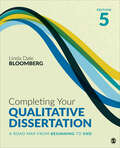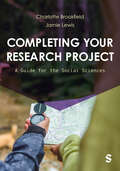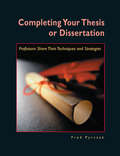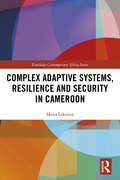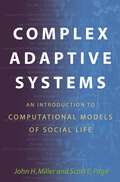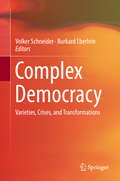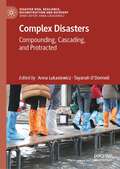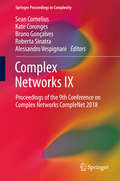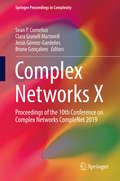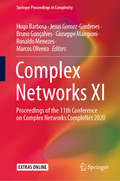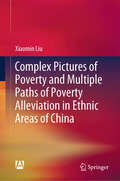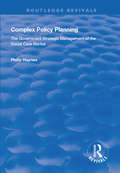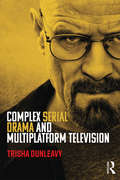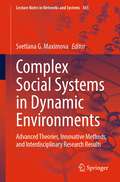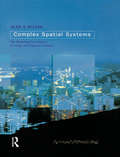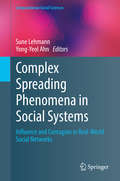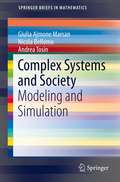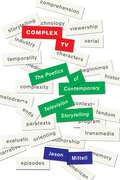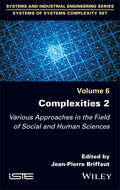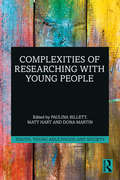- Table View
- List View
Completing Your Qualitative Dissertation: A Road Map From Beginning to End
by Linda Dale BloombergAddressing the key challenges facing doctoral students, this text fills a gap in qualitative literature by offering comprehensive guidance and practical tools for navigating each step in the qualitative dissertation journey, including the planning, research, and writing phases. Author Linda Dale Bloomberg blends the conceptual, theoretical, and practical, so that the book becomes a dissertation in action—a logical and cohesive explanation and illustration of content and process. The Fifth Edition includes a greater focus on how qualitative traditions or genres can encompass a critical social justice agenda, and this broader coverage allows the book to have wider application for dissertation work within the constantly evolving field of qualitative inquiry. This edition also addresses some significant changes in the field that have come about since the onset of the COVID-19 pandemic, impacting how to conduct dissertation research both ethically and credibly by adopting new and innovative methods and approaches. A greater focus on ethics, rigor, researcher positionality, and reflexivity is highlighted and interwoven throughout.
Completing Your Qualitative Dissertation: A Road Map From Beginning to End
by Linda Dale BloombergAddressing the key challenges facing doctoral students, this text fills a gap in qualitative literature by offering comprehensive guidance and practical tools for navigating each step in the qualitative dissertation journey, including the planning, research, and writing phases. Author Linda Dale Bloomberg blends the conceptual, theoretical, and practical, so that the book becomes a dissertation in action—a logical and cohesive explanation and illustration of content and process. The Fifth Edition includes a greater focus on how qualitative traditions or genres can encompass a critical social justice agenda, and this broader coverage allows the book to have wider application for dissertation work within the constantly evolving field of qualitative inquiry. This edition also addresses some significant changes in the field that have come about since the onset of the COVID-19 pandemic, impacting how to conduct dissertation research both ethically and credibly by adopting new and innovative methods and approaches. A greater focus on ethics, rigor, researcher positionality, and reflexivity is highlighted and interwoven throughout.
Completing Your Research Project: A Guide for the Social Sciences
by Charlotte Brookfield Jamie LewisSimple. Comprehensive. Logical. This book is a companion guide for anyone completing a research project in the social sciences. It covers the whole research process, from planning, developing, collecting data, analysing data, and writing up. It will help you manage and complete your research project successfully. It will guide you on: -Planning your research project -Developing data collection tools -Analysing and interpreting data -Presenting your research in different formats Featuring chapter objectives, checklists, student exercises, weblinks, and further reading, this comprehensive guide ensures readers navigate the complexities of research within a manageable step-by-step framework.
Completing Your Research Project: A Guide for the Social Sciences
by Charlotte Brookfield Jamie LewisSimple. Comprehensive. Logical. This book is a companion guide for anyone completing a research project in the social sciences. It covers the whole research process, from planning, developing, collecting data, analysing data, and writing up. It will help you manage and complete your research project successfully. It will guide you on: -Planning your research project -Developing data collection tools -Analysing and interpreting data -Presenting your research in different formats Featuring chapter objectives, checklists, student exercises, weblinks, and further reading, this comprehensive guide ensures readers navigate the complexities of research within a manageable step-by-step framework.
Completing Your Thesis or Dissertation: Professors Share Their Techniques & Strategies
by Fred Pyrczak• Seventy professors share their tips, techniques, and strategies for overcoming roadblocks to the completion of a thesis or dissertation. • Many of the professors share their personal experiences in completing their dissertations. With hindsight, they offer advice based on these experiences. The personal nature of these essays makes fascinating reading. • The professors’ contributions cover a wide range of topics including · selecting a topic, · selecting a chair and a committee, · working with the chair and committee, · selecting literature to review, · writing a literature review, · time management, · overcoming writer’s block, · overcoming anxiety, · putting the thesis/dissertation into proper perspective, · establishing support groups, · understanding the role of the dissertation in professional development, · and many others! • This “in-their-own-words” book allows students to select the advice that is best suited to their situations and work styles. • Running sidebars throughout the book help students locate information on the matters with which they need help. • Ideal for independent reading by your students or use each of the contributions as a discussion topic in a thesis/dissertation preparation course.
Complex Adaptive Systems, Resilience and Security in Cameroon (Routledge Contemporary Africa)
by Manu LekunzeComplex Adaptive Systems, Resilience and Security in Cameroon comprehensively maps and analyses Cameroon’s security architecture to determine its resilience. The author examines the key actors involved in Cameroon’s security and evaluates the organisational structures, before analysing the different security systems that arise from the interplay between the two. He also shows how these security networks can be better conceived as complex adaptive systems, interdependent on other environmental, economic and societal systems. In this regard, security actors become security agents. Finally, arguing that security should be pursed from a resilience perspective, this book seeks to comment on the contemporary situation in Cameroon and its possible trajectory for the future. Providing a timely assessment of security in Cameroon, this book will be of interest to scholars and students of African politics and Security Studies.
Complex Adaptive Systems: An Introduction to Computational Models of Social Life (Princeton Studies in Complexity #14)
by John H. Miller Scott PageThis book provides the first clear, comprehensive, and accessible account of complex adaptive social systems, by two of the field's leading authorities. Such systems--whether political parties, stock markets, or ant colonies--present some of the most intriguing theoretical and practical challenges confronting the social sciences. Engagingly written, and balancing technical detail with intuitive explanations, Complex Adaptive Systems focuses on the key tools and ideas that have emerged in the field since the mid-1990s, as well as the techniques needed to investigate such systems. It provides a detailed introduction to concepts such as emergence, self-organized criticality, automata, networks, diversity, adaptation, and feedback. It also demonstrates how complex adaptive systems can be explored using methods ranging from mathematics to computational models of adaptive agents. John Miller and Scott Page show how to combine ideas from economics, political science, biology, physics, and computer science to illuminate topics in organization, adaptation, decentralization, and robustness. They also demonstrate how the usual extremes used in modeling can be fruitfully transcended.
Complex Democracy: Varieties, Crises, and Transformations
by Volker Schneider Burkard EberleinThis book presents a state-of-the art collection of original contributions on democracy, addressing three related themes: the complexity of modern democracies and their structural diversity; coping strategies of democracies in times of crises; and current and potential trajectories and transformations of democracy. The first part of the book maps the democratic landscape by revealing the diversity of democratic political systems, through either comparative analysis or case studies on the specific nature of political and administrative systems in interest intermediation and identity construction. The second part presents articles that investigate the response of democracies to times of crisis, with an emphasis on political economies and policy processes within the European Union. The third part offers studies on democracies that explore their adaptive potential in the context of globalization and in that of broader technical, institutional or cultural changes.
Complex Disasters: Compounding, Cascading, and Protracted (Disaster Risk, Resilience, Reconstruction and Recovery)
by Tayanah O’Donnell Anna LukasiewiczThis Edited book introduces the concept of complex disasters and considers both disaster risks and impacts across the disaster management spectrum – Prevention – Preparation – Response and Recovery. Three types of complex disasters are analysed – ‘Compound’, ‘Cascading’ and ‘Protracted’. Case studies include hazards from fires, through to floods, sea level rise and typhoons are explored through case studies from Australia and the Asia Pacific region. Each is written by scholars and/or practitioners with acknowledged expertise in the field and most chapters are based on detailed case studies of ongoing or recent research projects. The book will be useful to researchers in climate, disaster, or environmental and economic policy, disaster risk reduction, and climate change studies, and practitioners and policy makers applying disaster theory and knowledge into policy and decision-making.
Complex Human Dynamics: From Mind to Societies (Understanding Complex Systems)
by Andrzej Nowak Katarzyna Winkowska-Nowak David BréeThis book, edited and authored by a closely collaborating network of social scientists and psychologists, recasts typical research topics in these fields into the language of nonlinear, dynamic and complex systems. The aim is to provide scientists with different backgrounds - physics, applied mathematics and computer sciences - with the opportunity to apply the tools of their trade to an altogether new range of possible applications. At the same time, this book will serve as a first reference for a new generation of social scientists and psychologists wishing to familiarize themselves with the new methodology and the "thinking in complexity".
Complex Justice
by Joshua M. DunnIn 1987 Judge Russell Clark mandated tax increases to help pay for improvements to the Kansas City, Missouri, School District in an effort to lure white students and quality teachers back to the inner-city district. Yet even after increasing employee salaries and constructing elaborate facilities at a cost of more than $2 billion, the district remained overwhelmingly segregated and student achievement remained far below national averages. Just eight years later the U.S. Supreme Court began reversing these initiatives, signifying a major retreat from Brown v. Board of Education. In Kansas City, African American families opposed to the district court's efforts organized a takeover of the school board and requested that the court case be closed. Joshua Dunn argues that Judge Clark's ruling was not the result of tyrannical "judicial activism" but was rather the logical outcome of previous contradictory Supreme Court doctrines. High Court decisions, Dunn explains, necessarily limit the policy choices available to lower court judges, introducing complications the Supreme Court would not anticipate. He demonstrates that the Kansas City case is a model lesson for the types of problems that develop for lower courts in any area in which the Supreme Court attempts to create significant change. Dunn's exploration of this landmark case deepens our understanding of when courts can and cannot successfully create and manage public policy.
Complex Networks IX
by Alessandro Vespignani Bruno Gonçalves Roberta Sinatra Sean Cornelius Kate CorongesThis book aims to bring together researchers and practitioners working across domains and research disciplines to measure, model, and visualize complex networks. It collects the works presented at the 9th International Conference on Complex Networks (CompleNet) in Boston, MA, March, 2018. With roots in physical, information and social science, the study of complex networks provides a formal set of mathematical methods, computational tools and theories to describe, prescribe and predict dynamics and behaviors of complex systems. Despite their diversity, whether the systems are made up of physical, technological, informational, or social networks, they share many common organizing principles and thus can be studied with similar approaches. This book provides a view of the state-of-the-art in this dynamic field and covers topics such as group decision-making, brain and cellular connectivity, network controllability and resiliency, online activism, recommendation systems, and cyber security.
Complex Networks X: Proceedings of the 10th Conference on Complex Networks CompleNet 2019 (Springer Proceedings in Complexity)
by Bruno Gonçalves Sean P. Cornelius Clara Granell Martorell Jesús Gómez-GardeñesThis book aims to bring together researchers and practitioners working across domains and research disciplines to measure, model, and visualize complex networks. It collects the works presented at the 10th International Conference on Complex Networks (CompleNet) in Taragona, Spain, March, 2019. With roots in physical, information and social science, the study of complex networks provides a formal set of mathematical methods, computational tools and theories to describe, prescribe and predict dynamics and behaviors of complex systems. Despite their diversity, whether the systems are made up of physical, technological, informational, or social networks, they share many common organizing principles and thus can be studied with similar approaches. This book provides a view of the state-of-the-art in this dynamic field and covers topics such as group decision-making, brain and cellular connectivity, network controllability and resiliency, online activism, recommendation systems, and cyber security. This text will appeal to students and researchers in the field.
Complex Networks XI: Proceedings of the 11th Conference on Complex Networks CompleNet 2020 (Springer Proceedings in Complexity)
by Bruno Gonçalves Ronaldo Menezes Giuseppe Mangioni Hugo Barbosa Jesus Gomez-Gardenes Marcos OliveiraThis book aims to bring together researchers and practitioners from diverse disciplines—from sociology, biology, physics, and computer science—who share a passion to better understand the interdependencies within and across systems. This volume contains contributions presented at the 11th International Conference on Complex Networks (CompleNet) in Exeter, United Kingdom, 31 March - 3 April 2020. CompleNet is a venue for discussing ideas and findings about all types of networks, from biological, to technological, to informational and social. It is this interdisciplinary nature of complex networks that CompleNet aims to explore and celebrate.
Complex Pictures of Poverty and Multiple Paths of Poverty Alleviation in Ethnic Areas of China
by Xiaomin LiuThis book analyzes poverty and the mechanisms that lead to it in ethnic rural areas in China using macro- and micro-examinations as well as field studies. It identifies new poverty situations and poverty alleviation in China’s ethnic areas and discusses the shortcomings of current poverty alleviation policies, while also making concrete policy suggestions to promote effective poverty alleviation in these regions.
Complex Policy Planning: The Government Strategic Management of the Social Care Market (Routledge Revivals)
by Philip HaynesFirst published in 1999, this book examines recent developments in the application of chaos and complexity theory to the applied social sciences and the implications for the government planning of social care services. The study argues that there are fundamental limitations to traditional government political and managerial planning structures. Chaos and complexity theory shows that the effects of time and space are critical aspects for planners to consider. Small changes in isolated social or individual factors can have larger scale effects on the future validity of a policy programme. In particular, rigid linear statistical calculations like the Government Standard Spending Assessment can undermine the ability of local authorities to make realistic plans. It is proposed that government political strategies and managerial methods of analysis need to better understand the complexity of information available to them. New political and institutional typologies are required if planning activity is to evolve to be of optimal social value.
Complex Serial Drama and Multiplatform Television
by Trisha DunleavyThis book examines the creative strategies, narrative characteristics, industrial practices and stylistic tendencies of complex serial drama. Exemplified by shows like HBO’s The Sopranos, AMC’s Mad Men and Breaking Bad, Showtime’s Dexter, and Netflix’s Stranger Things, complex serials are distinguished by their conceptual originality, narrative complexity, transgressive lead characters and serial allure. As a drama form that continues to expand and diversify in today’s television, HBO’s Boardwalk Empire and Game of Thrones, Netflix’s Orange Is the New Black and Hulu’s The Handmaid’s Tale provide further examples. Dunleavy investigates the strategies that underpin the innovations, influence and success of complex serial drama, giving students and scholars a nuanced understanding of this contemporary TV form.
Complex Social Systems in Dynamic Environments: Advanced Theories, Innovative Methods, and Interdisciplinary Research Results (Lecture Notes in Networks and Systems #365)
by Svetlana G. MaximovaThis edited book considers social systems as self-organizing structures that reproduce new structural elements endowed with certain functional connections. The authors analyze innovative processes in social systems, leading to the sustainable convergence of knowledge and the emergence of technologies that improve the level of material well-being in society. The book summarizes research results in the field of digitalization and reveals deep connections with social problems. In addition, the book presents a whole array of innovative research on social systems management and the application of knowledge and intelligence to the solution of social problems. The contributing scholars and practitioners reflect on various types of social systems and assess the influence of disruptive factors from natural and coupled human-natural environments, discussing possible mechanisms for their neutralization. Sustainable development of social systems is among the most important tasks facing the contemporary world. The contributed book highlights challenges to the sustainability of social systems, draws sociotechnical images of the future world order generated by the rapid development of intellectual technologies, and critically analyzes promising concepts for more sustainable social future. Among the discussed topics in the book are social governance, digital economy, technological landscapes, social systems modeling and simulation, cyber-social systems, knowledge-based innovation systems, complex processes in social systems, institutional arrangements, and other advancing research areas. The high-quality and original studies presented in the book appeal to those interested in broadening their perspectives on complexity science, complex social systems research, complex systems management, advanced technological development in social systems, etc. Since the book is rich with well-thought theories, advanced research approaches, and interdisciplinary research results, it becomes a great source of new ideas and insights on complex social systems.
Complex Spatial Systems: The Modelling Foundations of Urban and Regional Analysis
by Alan Geoffrey WilsonA comprehensive core text from the expert in the field introducing students to the main issues of spatial systems modelling and analysis.
Complex Spreading Phenomena in Social Systems: Influence and Contagion in Real-World Social Networks (Computational Social Sciences)
by Yong-Yeol Ahn Sune LehmannThis text is about spreading of information and influence in complex networks. Although previously considered similar and modeled in parallel approaches, there is now experimental evidence that epidemic and social spreading work in subtly different ways. While previously explored through modeling, there is currently an explosion of work on revealing the mechanisms underlying complex contagion based on big data and data-driven approaches.This volume consists of four parts. Part 1 is an Introduction, providing an accessible summary of the state of the art. Part 2 provides an overview of the central theoretical developments in the field. Part 3 describes the empirical work on observing spreading processes in real-world networks. Finally, Part 4 goes into detail with recent and exciting new developments: dedicated studies designed to measure specific aspects of the spreading processes, often using randomized control trials to isolate the network effect from confounders, such as homophily. Each contribution is authored by leading experts in the field. This volume, though based on technical selections of the most important results on complex spreading, remains quite accessible to the newly interested. The main benefit to the reader is that the topics are carefully structured to take the novice to the level of expert on the topic of social spreading processes. This book will be of great importance to a wide field: from researchers in physics, computer science, and sociology to professionals in public policy and public health.
Complex Systems and Society: Modeling and Simulation (SpringerBriefs in Mathematics)
by Giulia Ajmone Marsan Nicola Bellomo Andrea TosinThis work aims to foster the interdisciplinary dialogue between mathematicians and socio-economic scientists. Interaction among scholars and practitioners traditionally coming from different research areas is necessary more than ever in order to better understand many real-world problems we face today. On the one hand, mathematicians need economists and social scientists to better address the methodologies they design in a more realistic way; on the other hand, economists and social scientists need to be aware of sound mathematical modelling tools in order to understand and, ultimately, solve the complex problems they encounter in their research. With this goal in mind, this work is designed to take into account a multidisciplinary approach that will encourage the transfer of knowledge, ideas, and methodology from one discipline to the other. In particular, the work has three main themes: Demystifying and unravelling complex systems; Introducing models of individual behaviours in the social and economic sciences; Modelling socio-economic sciences as complex living systems. Specific tools examined in the work include a recently developed modelling approach using stochastic game theory within the framework of statistical mechanics and progressing up to modeling Darwinian evolution. Special attention is also devoted to social network theory as a fundamental instrument for the understanding of socio-economic systems.
Complex TV: The Poetics of Contemporary Television Storytelling
by Jason MittellA comprehensive and sustained analysis of the development of storytelling for televisionOver the past two decades, new technologies, changing viewer practices, and the proliferation of genres and channels has transformed American television. One of the most notable impacts of these shifts is the emergence of highly complex and elaborate forms of serial narrative, resulting in a robust period of formal experimentation and risky programming rarely seen in a medium that is typically viewed as formulaic and convention bound. Complex TV offers a sustained analysis of the poetics of television narrative, focusing on how storytelling has changed in recent years and how viewers make sense of these innovations. Through close analyses of key programs, including The Wire, Lost, Breaking Bad, The Sopranos, Veronica Mars, Curb Your Enthusiasm, and Mad Men the book traces the emergence of this narrative mode, focusing on issues such as viewer comprehension, transmedia storytelling, serial authorship, character change, and cultural evaluation. Developing a television-specific set of narrative theories, Complex TV argues that television is the most vital and important storytelling medium of our time.
Complex Trauma Regulation in Children: A Body-Based Attachment Approach
by Suellen Thomson-LinkThis book outlines both the theory and application of regulation intervention strategies for children with complex trauma history. National statistics identify that 1:7 children in the United States are subjected to child abuse or neglect. The age group with the highest reported incidences are in the 1-3 year old age group. The primary perpetrators of this abuse are the child’s caregivers. This age is closely associated with the critical period of development in the areas of the brain, the child’s physiology and their social/emotional well being. When primary attachment is disrupted, delays and disruptions across many domains occur. When the perpetrator of their trauma is the same person who should be ensuring their safety, a child develops behaviors in an attempt to make sense of their world. The behaviors serve a purpose. Behavioral approaches which rely on positive and negative consequences do not adequately address the cause of the behavior and are therefore ineffective. Other existing trauma interventions rely on the individual to cognitively process information. However, when dysregulated, retrieval of information from the frontal lobe of the brain is not physiologically possible. All these approaches also intervene on the assumption that the child knows what normal regulation feels like. Most of these children however have only known chaos and fear novelty. This attachment based intervention model incorporates neurological, physiological, observational and practical regulation intervention strategies for anyone working with children with complex trauma history. It is able to be applied in home, school, community and in therapy environments. When a child feels regulated and safe, the effectiveness of the child’s trauma treatment can be enhanced.
Complexities 2: Various Approaches in the Field of Social and Human Sciences
by Jean-Pierre Briffaut Daniel KrobAwareness of complexity in science and technology dates back to the 1970s. However, all social systems tend to develop structures that become more complex over time, be it within families, tribes, cities, states, or societal and economic organizations. Complexities 2 covers a broad array of fields, from justice and linguistics to education and organizational management. The aim of this book is to show, without aiming to provide a comprehensive overview, the diversity of approaches and behaviors towards the obstacle of complexity in understanding and achieving human actions. When we see complexity as the incompleteness of knowledge and the uncertainty of the future, we realize that simplifying is not an adequate approach to complexity, even in the humanities and social sciences. This book explores the relationship between order and disorder in this field of knowledge.
Complexities of Researching with Young People (Youth, Young Adulthood and Society)
by Paulina Billett Matt Hart Dona MartinCurrently, most books on youth research available on the market focus on ‘how to’ conduct youth research or the research process itself. This edited collection proposes to take this process a step further and discuss the complexities of youth research from a practical and theoretical context.In total, five themes are examined – conceptualising young people, ethics and consent, the digital, voice, participation and unexpected tensions. In this book, authors from six countries explore the complexities of researching with young people across disciplines and national contexts.Offering a closeup examination of their own research experiences, the authors address the complexities of researching with young people beyond simple questions of protection from harm and coercion by problematising notions of ‘resilience’, ‘participation’, ‘risk’ and ‘voice’. This edited collection takes the reader through an exploration of its key themes and, in doing so, presents a cast of candid and insightful accounts from youth researchers situated within the humanities and social sciences.
